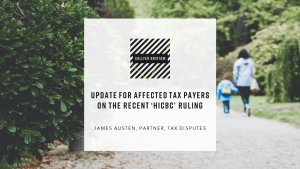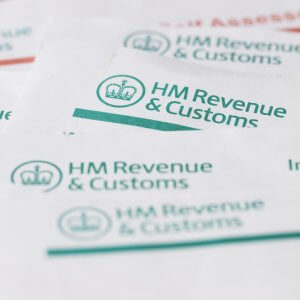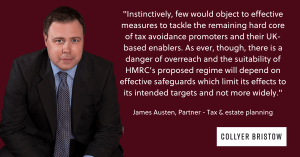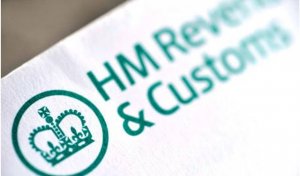- Tax disputes & investigations

Longer Reads
COURT OF APPEAL JUDGMENT BRINGS LANDMARK HICBC CHILD BENEFIT CASE TO A SUCCESSFUL CLOSE
The Court unanimously decided that the taxpayer, Jason Wilkes, succeeded on all points.
The Court of Appeal’s decision in this case is final. The retrospective change in tax law in Finance Act 2022, however, means the Court’s decision will not automatically determine the outcome of the 400 other HICBC cases before the First-tier Tribunal – and it is not relevant at all to the hundreds of thousands of other affected taxpayers.
2 minute read
Published 7 December 2022
Key information
- Specialisms
- Private Wealth
- Services
- Tax disputes & investigations
The Court of Appeal (Lords Justices Newey, Baker, and Arnold) has today handed down its judgment in HMRC’s appeal in the leading HICBC case (HMRC -v- Wilkes). The Court unanimously rejected every one of HMRC’s arguments, and upheld the Upper Tribunal’s decision – conclusively determining the outcome in favour of the taxpayer, Jason Wilkes. HMRC has decided not to seek permission to appeal the Court of Appeal’s judgment.
This case addressed whether HMRC could impose the HICBC by means of “Discovery Assessments”, which enable HMRC to demand tax outside the normal four-year assessment limit. The Court of Appeal, agreeing with the First-tier Tribunal and the Upper Tribunal, has conclusively determined that HMRC was wrong to impose the HICBC by Discovery Assessments on hundreds of thousands of taxpayers in the UK.
However, a controversial – and arguably unjust – retrospective change in tax law announced by then-Chancellor Rishi Sunak in his 2021 Budget, and becoming law in sections 97-99 Finance Act 2022, meant that HMRC ensured in advance of this judgment that hundreds of thousands of other taxpayers who were similarly subjected to HICBC Discovery Assessments cannot take the benefit of the Wilkes case. So HMRC have won, even though they lost.
The effects of the retrospective provisions of Finance Act 2022 are particularly damaging for those 400-or-so taxpayers whose HICBC Discovery Assessment cases are waiting to be heard in the First-tier Tribunal: absent the Finance Act 2022 provisions, those taxpayers would normally have expected to apply the outcome in Wilkes in their own appeals. But, now, unless their appeal was both: (1) notified to the Tax Tribunal on or before 30 June 2021; and (2) a stated ground of appeal was that “…the [Discovery] assessment is invalid as a result of its not relating to the discovery of income which ought to have been assessed to income tax but which had not been so assessed” (as it was put in Finance Act 2022), an appellant is unable to rely on the outcome of Wilkes.
As HMRC would have known, vanishingly few Tribunal appeal grounds, written by un-represented lay appellants, are sufficiently particularised to meet such a strict requirement. The result of this, we say, is to undermine the rule of law to the detriment of taxpayers who knew nothing of HICBC at the relevant time. Many consider this to be exceptionally harsh and unjust. One hopes that First-tier Tribunal judges, who are well used to interpreting what taxpayers meant in their appeal notices, rather than what they necessarily wrote, will be scrupulous in interpreting written grounds of appeal fairly when applying this requirement, to avoid the obvious injustices that would otherwise arise.
Some, including HMRC, previously claimed that success for Jason Wilkes in this case would be contrary to principle because other taxpayers, who were aware of the HICBC, did pay the charge and so it would be unfair for Mr Wilkes to escape it for technical reasons. This difference of treatment between taxpayers could only arise because of the flawed design of the HICBC regime, which was the responsibility of the Government. Furthermore, the differential treatment between taxpayers has been compounded by the additional injustices brought about by Finance Act 2022 – because Mr Wilkes (and, probably, a handful of others with pending appeals in the FTT) will escape the imposition of the charge, whilst 180,000+ taxpayers in the same position as them will not.
Commenting on the Court of Appeal’s judgment, James Austen, Partner and Head of Tax disputes & investigations at Collyer Bristow, acting pro-bono for Mr Wilkes, said:
“We have been pleased to support Jason and Samantha Wilkes in their fight for justice against HMRC. I am delighted that the Court of Appeal has unanimously rejected all of HMRC’s arguments and has decided that HMRC were wrong to impose the HICBC by Discovery Assessments. This important case highlights the fundamental flaws of the entire HICBC regime, and it is a reminder that those flaws have been compounded by the further injustices caused by the Government’s retrospective tax changes, which were deliberately designed to undermine the Court of Appeal’s judgment, to the detriment of countless other taxpayers in the same position. Hopefully, the Government will now take the opportunity to review and repeal the broken HICBC regime: if necessary, the same policy objectives could be better met by fairer means.”
All press enquiries should be made in the first instance to Liam McCafferty, Byfield Consultancy: liam@byfieldconsultancy.com / +44 (0)20 7092 3994
For more information, click here to read a copy of the Court of Appeal’s judgment.
Related content
Longer Reads
COURT OF APPEAL JUDGMENT BRINGS LANDMARK HICBC CHILD BENEFIT CASE TO A SUCCESSFUL CLOSE
The Court unanimously decided that the taxpayer, Jason Wilkes, succeeded on all points.
The Court of Appeal’s decision in this case is final. The retrospective change in tax law in Finance Act 2022, however, means the Court’s decision will not automatically determine the outcome of the 400 other HICBC cases before the First-tier Tribunal – and it is not relevant at all to the hundreds of thousands of other affected taxpayers.
Published 7 December 2022
Associated sectors / services
Authors
The Court of Appeal (Lords Justices Newey, Baker, and Arnold) has today handed down its judgment in HMRC’s appeal in the leading HICBC case (HMRC -v- Wilkes). The Court unanimously rejected every one of HMRC’s arguments, and upheld the Upper Tribunal’s decision – conclusively determining the outcome in favour of the taxpayer, Jason Wilkes. HMRC has decided not to seek permission to appeal the Court of Appeal’s judgment.
This case addressed whether HMRC could impose the HICBC by means of “Discovery Assessments”, which enable HMRC to demand tax outside the normal four-year assessment limit. The Court of Appeal, agreeing with the First-tier Tribunal and the Upper Tribunal, has conclusively determined that HMRC was wrong to impose the HICBC by Discovery Assessments on hundreds of thousands of taxpayers in the UK.
However, a controversial – and arguably unjust – retrospective change in tax law announced by then-Chancellor Rishi Sunak in his 2021 Budget, and becoming law in sections 97-99 Finance Act 2022, meant that HMRC ensured in advance of this judgment that hundreds of thousands of other taxpayers who were similarly subjected to HICBC Discovery Assessments cannot take the benefit of the Wilkes case. So HMRC have won, even though they lost.
The effects of the retrospective provisions of Finance Act 2022 are particularly damaging for those 400-or-so taxpayers whose HICBC Discovery Assessment cases are waiting to be heard in the First-tier Tribunal: absent the Finance Act 2022 provisions, those taxpayers would normally have expected to apply the outcome in Wilkes in their own appeals. But, now, unless their appeal was both: (1) notified to the Tax Tribunal on or before 30 June 2021; and (2) a stated ground of appeal was that “…the [Discovery] assessment is invalid as a result of its not relating to the discovery of income which ought to have been assessed to income tax but which had not been so assessed” (as it was put in Finance Act 2022), an appellant is unable to rely on the outcome of Wilkes.
As HMRC would have known, vanishingly few Tribunal appeal grounds, written by un-represented lay appellants, are sufficiently particularised to meet such a strict requirement. The result of this, we say, is to undermine the rule of law to the detriment of taxpayers who knew nothing of HICBC at the relevant time. Many consider this to be exceptionally harsh and unjust. One hopes that First-tier Tribunal judges, who are well used to interpreting what taxpayers meant in their appeal notices, rather than what they necessarily wrote, will be scrupulous in interpreting written grounds of appeal fairly when applying this requirement, to avoid the obvious injustices that would otherwise arise.
Some, including HMRC, previously claimed that success for Jason Wilkes in this case would be contrary to principle because other taxpayers, who were aware of the HICBC, did pay the charge and so it would be unfair for Mr Wilkes to escape it for technical reasons. This difference of treatment between taxpayers could only arise because of the flawed design of the HICBC regime, which was the responsibility of the Government. Furthermore, the differential treatment between taxpayers has been compounded by the additional injustices brought about by Finance Act 2022 – because Mr Wilkes (and, probably, a handful of others with pending appeals in the FTT) will escape the imposition of the charge, whilst 180,000+ taxpayers in the same position as them will not.
Commenting on the Court of Appeal’s judgment, James Austen, Partner and Head of Tax disputes & investigations at Collyer Bristow, acting pro-bono for Mr Wilkes, said:
“We have been pleased to support Jason and Samantha Wilkes in their fight for justice against HMRC. I am delighted that the Court of Appeal has unanimously rejected all of HMRC’s arguments and has decided that HMRC were wrong to impose the HICBC by Discovery Assessments. This important case highlights the fundamental flaws of the entire HICBC regime, and it is a reminder that those flaws have been compounded by the further injustices caused by the Government’s retrospective tax changes, which were deliberately designed to undermine the Court of Appeal’s judgment, to the detriment of countless other taxpayers in the same position. Hopefully, the Government will now take the opportunity to review and repeal the broken HICBC regime: if necessary, the same policy objectives could be better met by fairer means.”
All press enquiries should be made in the first instance to Liam McCafferty, Byfield Consultancy: liam@byfieldconsultancy.com / +44 (0)20 7092 3994
For more information, click here to read a copy of the Court of Appeal’s judgment.
Associated sectors / services
- Tax disputes & investigations
Authors
Need some more information? Make an enquiry below.
Subscribe
Please add your details and your areas of interest below
Article contributor
James
AustenPartner
Specialising in UK trusts, tax & estate planning, Private wealth, Tax disputes & investigations and Trusts & Inheritance disputes
Enjoy reading our articles? why not subscribe to notifications so you’ll never miss one?
Subscribe to our articlesMessage us on WhatsApp (calling not available)
Please note that Collyer Bristow provides this service during office hours for general information and enquiries only and that no legal or other professional advice will be provided over the WhatsApp platform. Please also note that if you choose to use this platform your personal data is likely to be processed outside the UK and EEA, including in the US. Appropriate legal or other professional opinion should be taken before taking or omitting to take any action in respect of any specific problem. Collyer Bristow LLP accepts no liability for any loss or damage which may arise from reliance on information provided. All information will be deleted immediately upon completion of a conversation.
Close










































